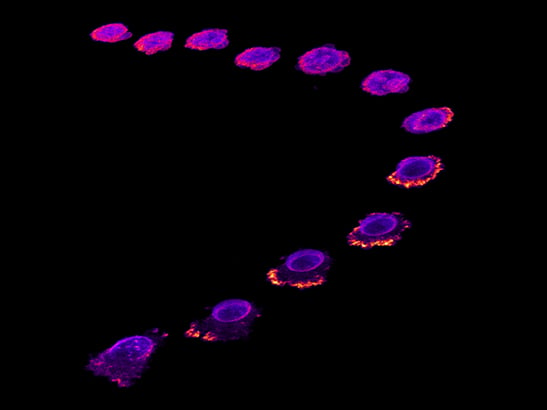.jpg)
Image: Micrograph of breast cancer cells stained brown for HER2 receptors
Treating advanced breast cancer with three drugs instead of one could boost the effectiveness of treatment and stop tumours developing resistance, a new study reports.
Researchers found that combining the targeted therapies neratinib and everolimus with standard hormone therapy blocked breast cancer’s escape routes that otherwise allow it to evolve and stop responding to treatment.
The study, conducted in breast cancer cells and in mice, found that triple therapy was better at shrinking tumours than each individual drug alone, or than combinations of two of the drugs.
Crucially, the team at The Institute of Cancer Research, London, and Puma Biotechnology found that the triple combination was also effective in cells that were already resistant to hormone therapy.
Using the three drugs together was not only effective, but also caused few side-effects in mice – raising hopes that the triple combination could offer a promising new treatment approach for women with advanced breast cancer.
The study is published in the journal Breast Cancer Research, and was funded by Puma Biotechnology and Breast Cancer Now.
Help transform breast cancer research by supporting our new programme of research into hormone receptor-positive breast cancer.
Stopping cancer cells from evolving resistance
The three treatments used together shrunk tumours in mice by 80 per cent – compared with only around 30 per cent when used singly or 70 per cent when used in a double combination.
Everolimus targets an important molecular pathway inside cells that helps control the way cells grow and multiply – and is often hijacked in cancer.
But if only everolimus and hormone therapy are used together, cancers switch to using the common breast cancer receptor HER2, or its sister HER3, to feed their growth.
Scientists at The Institute of Cancer Research (ICR) found that by also treating with neratinib – which targets HER2 and HER3 –they were able to stop the cancer cells from evolving resistance.
Looking at the cells in molecular detail, the researchers found that the combination resulted in lower levels of proteins that control the timing of cell division, and reduced activity of the cancer gene AKT.
The triple combination also reduced the number of receptors in cancer cells that they use to grow, including the oestrogen receptor, epidermal growth factor receptor (EGFR), and HER2 and HER3.
Planning a clinical trial of our drug combination
Study leader Dr Lesley-Ann Martin, Staff Scientist at the ICR, said:
“Our study found that a triple combination of two targeted drugs and hormone therapy is better at halting the growth of breast cancer cells and tumours than any of the treatments individually.
“Crucially, it seems to stop breast cancers from switching to different growth strategies to evade the effects of treatment, by cutting off all their available escape routes.
“Women with advanced breast cancer face not only the stress of having cancer but uncertainty over whether and when their disease will begin to resist treatment. New treatments that can keep drug resistance at bay are badly needed, and we are now working with doctors and companies to plan a clinical trial of our drug combination.”
Professor Paul Workman, Chief Executive of the ICR, said:
“Overcoming cancer’s ability to evolve and adapt to treatment is the single biggest challenge we face if we are to defeat the disease.
“By strategically combining therapies, just as we do in other diseases such as tuberculosis and HIV, this study has shown that we can box in breast cancer – outsmarting it by blocking off each route it would use to evade treatment.”
